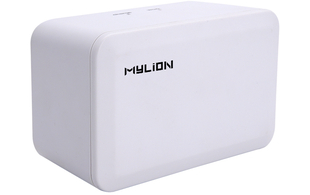Mylion MU68W
Overview
The MU68W Mylion Mini UPS is an advanced 12V Lithium Battery Backup Power Supply, specifically engineered to offer a dependable power solution for essential devices. Boasting a compact and efficient design, this Uninterruptible Power Supply (UPS) ensures that connected devices continue to operate smoothly during AC power outages. With a robust 12V, 2A, 45Wh power output and a high-quality Li-ion battery, it provides up to 4 hours of consistent power, making it an ideal solution for a wide array of applications. Whether it's WiFi Routers, IP phones, Access Control Units, CCTV Cameras, or Smart Home Monitors.
Designed with safety and efficiency in mind, the MU68W Mylion Mini UPS comes with a smart protection system that cuts off power at temperatures above 70°C, ensuring the safety of your devices. Its anti-fire plastic casing further enhances its safety features. Certified with CE, FCC, and UL tests, it guarantees reliable performance. The MU68W Mylion Mini UPS seamlessly transitions from AC to UPS power, offering a constant 12V voltage output, and simultaneously charges the UPS battery while powering your device, ensuring uninterrupted operation.
Recommended for use in business environments and for vulnerable users who may not have access to cellular connectivity, uninterruptible power supplies are becoming an increasingly important product to ensure VoIP connectivity in the event of a power cut.
As per Ofcom's guidelines (July 2022) providers must offer a solution such as battery back-up or a mobile phone for people who are dependent on their landline. This is to ensure users can contact the emergency services in the event of a power cut.
For ease of deployment, this device is provided with an adapter bundle making it simple to connect to any device.
*Backup time will vary depending on the power consumption of each connected device.
- Compact & lightweight
- Offers up to 4 hours of power under consistent use*
- Smart protection from overheating, over charge & discharge and short circuit
- CE, FCC, EMC, and UL certified
- Maintenance free
- Features 1 x 12V / 3 A 44.4wh 12000mAh lithium battery
- Supplied with a 1 year manufacturer's warranty
*Backup time will vary depending on the power consumption of each connected device.
-
 Mylion Mini UPS MU68W 12V Power SupplyCode: MU68W MPN: MU68W Availability: In stockRRP £69.99+VAT
Mylion Mini UPS MU68W 12V Power SupplyCode: MU68W MPN: MU68W Availability: In stockRRP £69.99+VAT -
Are you a telecoms / IT reseller, ITSP or installer?
For access to discounted trade pricing, simply register and become a ProVu Reseller today.
Already have an account? log in for trade pricing
Accessories
 Y cable used to power 2 x 12V devicesCode: CABLE-Y-12v-12v MPN: CABLE-Y-12v-12v Availability: Order on demandRRP £18.42+VAT
Y cable used to power 2 x 12V devicesCode: CABLE-Y-12v-12v MPN: CABLE-Y-12v-12v Availability: Order on demandRRP £18.42+VAT Standard single 12v cable used to power 1 x routerCode: CABLE-12v MPN: CABLE-12v Availability: Order on demandRRP £18.42+VAT
Standard single 12v cable used to power 1 x routerCode: CABLE-12v MPN: CABLE-12v Availability: Order on demandRRP £18.42+VAT Y cable used to power 1 x 12V for a router & 1 x 5v phoneCode: CABLE-Y-12v-5v MPN: CABLE-Y-12v-5v Availability: In stockRRP £18.42+VAT
Y cable used to power 1 x 12V for a router & 1 x 5v phoneCode: CABLE-Y-12v-5v MPN: CABLE-Y-12v-5v Availability: In stockRRP £18.42+VAT-
Are you a telecoms / IT reseller, ITSP or installer?
For access to discounted trade pricing, simply register and become a ProVu Reseller today.
Already have an account? log in for trade pricing
Support & Downloads
Technical details
Useful Links
Warranty
Mylion UPS' are supplied with a 1 year manufacturer's warranty as standard.
Battery Information
What is the lifespan (design life) of a battery?
The typical lifespan of a UPS battery is 3-5 years from the start of production. However battery life can vary greatly depending on environmental conditions and amount of discharge cycles. For instance, battery life decreases if the UPS is operated under a high temperature environment or is frequently discharged.
Please remember that the life of the battery starts at the time of production (not at the time of first usage).
How should I store the batteries?
A battery must be recharged every 3 months in storage (20°C), otherwise it will deplete its capacity. Cold and dry would be the optimal storage environment (below 20°C). In a very hot and humid environment (20°C-40°C), it is recommended to recharge them every 1-2 months.
Should I buy a UPS with BP or a bigger UPS for the same Back-up time?
When a client is looking for a UPS to safeguard their load with a determined back-up time, it always comes to the end decision, to buy a small UPS with an additional Battery Pack or to just buy a bigger UPS. Because of the price difference (UPS + BP > Bigger UPS) the customer normally decides to pay less for a bigger UPS then to pay more and have the ideal solution of a UPS with an additional BP.
The UPS with a Battery Pack may look like the expensive option, but bigger UPS have a higher power consumption, meaning that over its lifetime having a bigger UPS will result in a higher electric bill.
Why is it recommended to carry out frequent battery tests?
One of the most critical rules in UPS maintenance and safety is performing a regular battery test. Our software offers a scheduling function for this task. If batteries are not checked regularly it may result in the following situations:
- Battery capacity will decrease over time and reach a point where it cannot support the load long enough. It might even render the UPS unusable.
- Continuous charging of faulty batteries may lead to leaks, swelling or even burning of the battery.
Basic Battery Test
The software will perform a 10 second battery test. Please note that the test only proves that the battery will hold the connected load for 10 seconds. Hence, the test will only determine if the battery is not depleted. We recommend the basic test at least once a month.
Real Life Test
Since the typical expected backup time is much longer than 10 seconds, we recommend a real life test to ensure the proper functionality of the UPS system.
Please cut off the input (i.e. by switching the input breaker or unplugging the input cable) and measure how long the UPS can backup the load. Knowing the load in watts (you can read it in the monitoring software), you can compare it with the real performance. Feel free to contact our support team if you need a recommendation. This will give you the best overview of the batteries condition.
You can also monitor the backup time changing over the lifespan of the batteries. If it drops below your requirement, please change the batteries. We recommend to perform the real life test with the following schedule:
- At the very beginning of any operation
- Every 6 months in the first 2 years
- Every 3 months after 2 years
How to measure the battery voltage with software?
To assess the battery condition you need to check the battery voltage. If opening the UPS and measuring the voltage with a multimeter is not possible, you can use the in-software provided measurement tool.
Please avoid misinterpreting the reading: When the UPS is charging, it will apply a charging voltage approx. of 13.7 VDC to the battery and it will try to boost the battery voltage to this value. If the charger is active, the software won't read the battery voltage, instead it will read the charger voltage. To avoid this, you need to switch into battery mode (simulate a mains failure). Without AC input, the charger will switch off and the battery voltage will shortly stabilise at its real voltage. At this point, you can get an accurate reading of the battery voltage.
Unfortunately, if the battery is in very bad shape it may immediately switch off the UPS and you may experience immediate shutdown. If the software was monitoring the UPS, it might have recorded one entry with very low voltage before shutdown.
When is it recommended to replace the batteries?
Please consider replacing your batteries if any of the following conditions apply:
- UPS shows low battery level despite having charged it for the sufficient amount of time
- UPS LCD displays weak batteries (depends on model)
- UPS is running for more than 3 years without a battery change
- The backup time has substantially reduced compared to the initial performance
- Regularly performed battery test (scheduled by software) will report issues with the batteries
What batteries should you choose to replace old ones?
Naturally the new batteries should have the same technical specification as old ones to ensure full compatibility. The only exception is the most critical parameter – energy capacity given in ampere hour (Ah), this may be the same, bigger or under some conditions even smaller than existing batteries. If you insist to install batteries of smaller capacity, please consult with us.
Attention: Always replace all batteries inside the UPS at the time, never mix old and new ones. Use only one type of batteries, never install mixed types of batteries.
What are the recommended replacement battery parameters?
Battery Capacity (Ah) will directly influence the backup time, but it will remain compatibile with the UPS if other parameters are fulfilled. Please pay attention to the parameters:
- Dimensions must be 99 x 65 x 151 +/-2 mm, equipped with T2 terminal – the battery must fit into the same place
- Special UPS batteries for deep-discharge application; never use car batteries
- Nominal voltage: 12VDC; Float charging voltage 13.6-13.8VDC or wider; Cycle use charging voltage 14.5-15.8VDC or wider
- Maximum continuous discharge current: minimum 40A
- Maximum charging current: minimum 2A
- Capacity recommended minimum as the batteries being replaced
- Working temperatures must fit your environment (consider for special desert/arctic applications)
Hint: As it may seem that there are many parameters to check, in fact there is a common industry standard for UPSs and in most cases asking for UPS batteries at your local store will suffice.
You cannot find "battery capacity (Ah)" at your local store?
Different battery manufacturers provide different ways to determine the battery capacity. There is little standardisation, and parameters may vary between battery manufacturers. For that reason, some battery manufacturers provide battery capacity in different formats, like “300W/5min” or other useful data.
Your new 8Ah offers a worse performance than the old 7Ah?
Essentially, a 7Ah battery means it will provide 0.35A (current) for 20h (total 20h x 0.35A = 7Ah). This value is always given in reference to 20h time period, as agreed by the industry. It is false to assume it may provide 35A for 0.2h (12min).
Why is that? Inside the battery, a chemical reaction has to take place. The battery is capable of delivering the shown battery capacity under a 20h span, but under less time, the chemical reaction cannot take place completely (it is not fast enough).
The most generic 7Ah batteries are capable to supply around 12A for 12min, which is a better performance then a 8Ah battery with a normal chemical delivery of 0.4A for 20h.
This batteries are called “high discharge” batteries. Despite having the same nominal 20h battery capacity, they can deliver even 50% more power for shorter periods like 5-10min! Rating by far more critical for UPS application than 20h-rating batteries.
Where can I buy replacement batteries?
We can help you source replacement batteries. Contact us to find out more.
Media downloads
 Mylion MU68W
Mylion MU68WHigh Resolution | Web | Thumb
 Mylion MU68W
Mylion MU68WHigh Resolution | Web | Thumb
 Mylion MU68W
Mylion MU68WHigh Resolution | Web | Thumb


